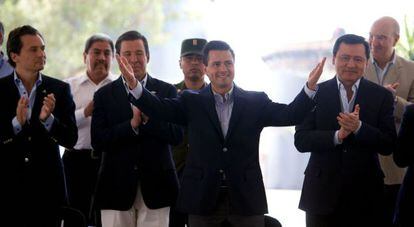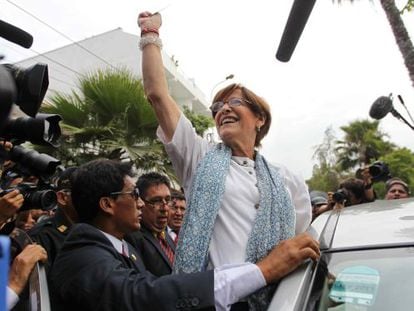Mexico stunned by new president’s flying start
PRI’s Peña Nieto takes firm grip on country’s reins with cross-party pact and education makeover. Real challenges will come with energy and tax reforms

It has not been uncommon over the past weeks to hear the people on the streets of Mexico City say such phrases as: “I would have never thought…” or “Who would have said…?” These exclamations represent a general sense of astonishment at the battery of initiatives adopted by President Enrique Peña Nieto in his first 100 days in office.
In just three months, the 46-year-old Institutional Revolutionary Party (PRI) leader has drastically changed the political landscape left by his conservative predecessor, Felipe Calderón. Peña Nieto has generated hope and expectations both inside and outside Mexico, which is nothing short of amazing coming from someone who was criticized during last year’s campaign for being a candidate fabricated by Televisa, the country’s powerful broadcaster, as well as by the PRI.
The day after taking office, Peña Nieto announced the so-called Pact for Mexico – an agenda of proposed reforms agreed upon with the two major opposition parties, the center-right National Action Party (PAN) and leftist Democratic Revolutionary Party (PRD).
Then, came the broad overhaul of Mexico’s archaic and corrupt educational system, and the spectacular arrest on corruption charges of Elba Esther Gordillo, who for decades was the powerful boss of the influential education workers union (SNTE) and one of the country’s most feared women.
Peña Nieto has also introduced anti-trust legislation aimed at breaking the telecommunications monopolies held by the three most important businessmen in Mexico: Carlos Slim, Emilio Azcárraga and Ricardo Salinas Pliego.
“No one is untouchable,” the president said, vowing to restructure the manner in which business is conducted in Mexico to help propel development and end rampant poverty. The obstacles that have kept the country from obtaining social equality, he said, are Mexico’s de facto powers, which include union bosses, heirs of the old Mexican corporate state, and powerful businessmen.
His announcement on the changes in the telecoms sector had immediate effects. Stocks in Slim’s América Móvil cellphone operator fell by seven percent while Standard & Poor’s adjusted the outlook for Mexico’s sovereign debt ratings to “positive” from “stable.”
But Peña Nieto’s real challenge will come when he introduces fiscal reforms and changes to the state-controlled energy sector. The PRI government is expected to face some opposition from the PRD and other leftist groups over plans to allow for foreign investment in Petróleos Mexicanos (Pemex) and proposals to place value-added taxes on medicines and foodstuffs for the first time.












































